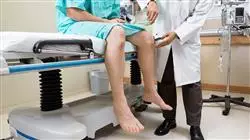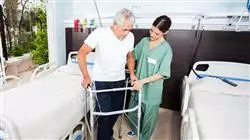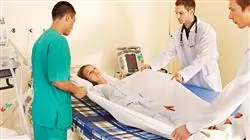University certificate
The world's largest faculty of nursing”
Description
You will learn about the specific care that neurological patients require, and recognize the most common complications, a vitally important issue for patients"

Neurological diseases have a broad impact on society. These diseases affect the entire population, regardless of age. Its consequences have a negative impact on the quality of life of the affected patients, preventing a high percentage of them from carrying out basic day-to-day activities, creating great dependence with the resulting cost, both in terms of healthcare and in terms of family and social care for the caregivers in charge of these patients (in Alzheimer's disease, 80% of the family members are cared for by relatives). They also have a major impact on mortality.
Stroke, for example, is the second leading cause of death globally and the first in women. Alzheimer’s disease, among other dementias, has a prevalence of between 4% and 9%, reaching 50% in people over 90 years of age. Parkinson’s disease, epilepsy, migraine, demyelinating and neuromuscular diseases also represent a serious social and health problem.
In addition, this professional master’s degree will study the pathophysiology of the main neurological diseases from a nursing approach. Having nurses who are highly qualified in the management of patients with different neurological pathologies increases the quality of care and reduces complications. Knowing the specific care required by neurological patients and knowing how to recognize the most common complications is of paramount importance in these patients, as it will allow them to recover their autonomy as much as possible. In this regard, there are several scientific articles that show that having nurses who are experts in advanced practices such as sclerosis, movement disorders or headaches and migraines, provides significant benefits. It highlights the adherence to treatment and increased independence, which promotes patients’ return to work and other daily activities.
This online professional master’s degree is made up of 10 modules and more than 100 units designed by a group of nursing professionals with extensive experience in healthcare and teaching, who carry out their work in a highly complex hospital setting.
Having highly qualified nursing staff increases the quality of care and reduces complications"
This professional master’s degree in Neurology Nursing contains the most complete and up-to-date scientific program on the market. The most important features include:
- More than 100 practical case studies presented by experts in neurological nursing
- Graphic, schematic and practical contents, which are designed to provide essential scientific and assistance information for professional practice
- Latest developments in neurological nursing
- Practical exercises
- Theoretical lessons, questions to the experts and clinical cases for individual reflection
- Content that is accessible from any fixed or portable device with an Internet connection
It has been proven that having nurses with expertise in advanced practice such as sclerosis, movement disorders or headaches and migraines has significant benefits for the patient, including encouraging them to continue with treatment and gaining increased independence"
The program’s teaching staff includes professionals from the sector who contribute their work experience to this program, as well as renowned specialists from leading societies and prestigious universities.
The multimedia content, developed with the latest educational technology, will provide the professional with situated and contextual learning, i.e., a simulated environment that will provide immersive training programmed to learn in real situations.
This program is designed around Problem-Based Learning, whereby the professional must try to solve the different professional practice situations that arise throughout the program. For this purpose, the professional will be assisted by an innovative interactive video system created by renowned and experienced experts.
Deepen your nursing knowledge and specialize in neurology service care with TECH"

In this professional master’s degree, you will learn to apply the pathophysiology of the main neurological diseases from a nursing approach"
Objectives
The professional master’s degree in Neurology Nursing is aimed at facilitating the performance of nurses dedicated to the treatment and care of neurological patients. In this field it is necessary to have a high level of competence and training to avoid possible complications and improve the level of self-care. This way, the nurse will be trained in the treatment required by patients in this area, with the utmost scientific rigor and professionalism, in order to achieve the following proposed objectives. This ensures greater satisfaction of future graduates on their way to achieving their professional goals.

The objective of this professional master’s degree is to help you become a qualified nurse in the care of patients in the neurology service, and for this you have TECH’s guarantee of quality”
General Objectives
- Learn and integrate general nursing care in the main neurological pathologies
- Perform standardized care plans, acquiring knowledge on how to perform nursing assessments according to functional patterns and use NANDA-NIC-NOC nursing taxonomy for care planning and evaluation
- Acquire knowledge and fundamentals of the pathophysiology of cerebrovascular diseases, epilepsy, movement disorders, multiple sclerosis, dementia, headache, neuromuscular diseases, neurological oncology and CNS infectious diseases and integrate them into nursing practice
- Understand the necessary knowledge in pathophysiology of neurological diseases
- Acquire in-depth knowledge of the most up-to-date basic medical-surgical treatments
- Acquire in-depth knowledge of diagnostic taxonomy to formulate nursing diagnoses, outcome criteria and nursing interventions
Specific Objectives
Module 1. CNS Anatomy CNS Infections and TBI
- Provide and expand basic knowledge in neuroanatomy
- Update knowledge of infectious diseases of the Nervous System
- Gain knowledge of cranioencephalic traumatism
- Develop in-depth knowledge of the specific nursing care in nervous system infectious diseases and cranioencephalic trauma
- Integrate nursing care into daily practice by following standardized care plans according to nursing taxonomies
Module 2. Cerebrovascular Diseases
- Contribute to and expand knowledge in cerebrovascular diseases
- Update knowledge on acute ischemic and hemorrhagic stroke
- Gain knowledge about the cerebral venous thrombosis and cerebrovascular syndromes
- Acquire in-depth knowledge of the specific nursing care of cerebrovascular diseases
- Integrate nursing care into daily practice by following standardized care plans according to nursing taxonomies
Module 3. Stroke Code and Stroke Hospital Care
- Gain in-depth knowledge of the Ictus Code and its activation
- Update and expand knowledge in acute stroke emergency care
- Update and broaden knowledge in stroke unit care
- Study protocolized procedures in the Stroke Unit
- Have strong knowledge of the specific nursing care needed in the Stroke Unit
- Integrate nursing care into daily practice by following standardized care plans according to nursing taxonomies
Module 4. Epilepsy
- Expand knowledge on the classification and etiopathogenesis of epilepsy
- Provide and expand knowledge in diagnostic tests
- Know, in depth, the specific nursing care involved in epilepsy
- Integrate nursing care into daily practice by following standardized care plans according to nursing taxonomies
Module 5. Mobility Disorders
- Know and broaden knowledge in etiopathogenesis of mobility disorders
- Expand knowledge in parkinsonisms
- Gain knowledge about dystonia, Tourette’s syndrome and Huntington’s disease
- Know the specific nursing care of mobility disorders diseases in depth
- Integrate nursing care into daily practice by following standardized care plans according to nursing taxonomies
Module 6. Multiple Sclerosis and Autoimmune CNS Diseases
- Expand knowledge on etiopathogenesis of multiple sclerosis
- Update knowledge of demyelinating diseases
- Gain knowledge about autoimmune diseases of the SNC
- Acquire in-depth knowledge of the specific nursing care of demyelinating diseases
- Integrate nursing care into daily practice by following standardized care plans according to nursing taxonomies
Module 7. Dementias and Cognitive Deterioration
- Acquire and expand knowledge in etiopathogenesis dementias
- Update knowledge on Alzheimer's disease and other degenerative dementias
- Study neuropsychological screening and assessment tests
- Know, in depth, the specific nursing care involved in dementia
- Integrate nursing care into daily practice by following standardized care plans according to nursing taxonomies
Module 8. Headaches
- Acquire and expand knowledge in the etiopathogenesis of primary headaches
- Update knowledge in migraine and secondary headaches
- Acquire knowledge about trigeminal autonomic cephalalgias and painful cranial neuropathies
- Acquire in-depth knowledge of the specific nursing care needed in the headaches and migraines
- Integrate nursing care into daily practice by following standardized care plans according to nursing taxonomies
Module 9. Neuromuscular Diseases
- Acquire and expand knowledge in the etiopathogenesis of neuromuscular diseases
- Update knowledge in myopathies and dystrophies
- Gain knowledge about myasthenia and motor neuron diseases
- Acquire in-depth knowledge of specific nursing care in neuro-oncological diseases
- Integrate nursing care into daily practice by following standardized care plans according to nursing taxonomies
Module 10. Neurologic Oncology
- Learn about and expand knowledge of primary glial and non-glial brain tumors
- Update knowledge on brain metastasis and meningeal carcinomatosis
- Study neurological complications of chemotherapy, radiotherapy and immunology
- Acquire in-depth knowledge of specific nursing care in neuro-oncological diseases
- Integrate nursing care into daily practice by following standardized care plans according to nursing taxonomies

You will expand your knowledge of neurological pathologies and develop the skills required for their specific care"
Professional Master's Degree in Nursing in the Neurology Service
The nursing area is a very relevant branch in the medical sector, since, thanks to their work, patients receive personalized and adequate care for each one, in addition, they are a support and an important pillar for the doctors' function. The constant renewal of knowledge for these professionals is a requirement for their career to increase in level and keep growing constantly. If you are a nurse and want to give a different approach to your career in order to acquire new skills, take a Professional Master's Degree in Nursing in the Neurology Service at TECH - the best online university in the world. Specialize with the most advanced studies in the market in pathophysiology, medical-surgical care and training on methodologies aimed at neurological patients. Update your knowledge and learn first-hand about the latest treatments and care that a person with a related disease should receive.
Get certified with a Professional Master's Degree focused on neurology
During 1,500 hours of fully online study you will specialize in the largest nursing faculty in the world. You will learn about specific care for patients with neurological diseases, which today are a large part of the population. At TECH Global University you will reinforce your knowledge in the specific care required by each patient; in addition, you will be a great support for people suffering from any pathology, because they will be able to be independent and resume their lifestyle without major complications. Additionally, you will have at your fingertips more than 100 topics designed by a team of high-level nursing specialists, as well as the theoretical and practical content presented through multimedia resources. Finally, you will participate in the clinical analysis of multiple cases, which will help you simulate possible situations in real cases. From this, you will be able to create standardized health plans and manage the criteria for activation of the Stroke Code.







